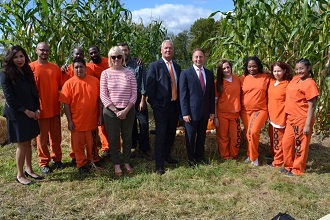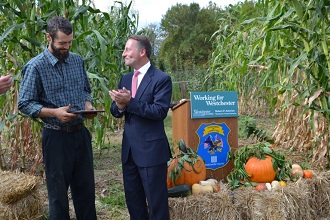Inmates and Correction Staff Partner with Food Bank and Family Services of Westchester to Feed the Hungry

Ned McCormack, Director of Communication, Westchester County
Oct. 4, 2017: For several years, inmates and staff from the Westchester County Department of Correction have been teaming up with partners from not-for-profit agencies to help feed the hungry with food grown right at the jail in Valhalla. New this year is the expansion of the "farm-to-table" gardening program to include its first female-specific program, with organic produce grown inside the secure confines of the women's unit.
Working in partnership with farmers from the Food Bank for Westchester and staff from Family Services of Westchester's (FSW's) EMERGE Program, the female inmates raised a wide variety of organic produce in raised garden beds that were built by staff members inside a recreation area of the correctional complex. The woman's program is designed for younger female offenders, some of whom are minors (under 18) and many of whom arrive at the jail as a result of drug-related crimes.
Inmate participation in all of the programs is strictly voluntary, and applicants are screened for participation by jail administrators and partner agencies. Produce includes lettuce, cabbage, kale, collard greens, beets, string beans, and a variety of herbs. Participants hand-harvest the vegetables to supplement other inmates' evening meals.
Westchester County Executive Robert P. Astorino said the gardening program has been a success on multiple levels. "From a rehabilitative perspective, we believe that it is important for all inmates to participate in positive activities while in jail," said Astorino. "This program teaches the importance and benefits of hard work. In the case of our younger female population, these women have daily responsibility for the care of their gardens and are learning firsthand how planting a seed in April can feed a hungry person in September."
For several years, the Department of Correction has partnered with the Food Bank to grow food for hungry residents of Westchester County. In 2016, inmates at the jail's farm grew over 1,600 pounds of fruits, vegetables, and herbs, which were used to supplement thousands of meals served by the Food Bank in the county.
Under the stewardship of organic farmer Doug DeCandia, the Food Bank maintains farms on five campuses in the county, including at the jail, the Woodfield Cottage juvenile detention facility (Valhalla), the Leake and Watts residential treatment center (Yonkers), the New York School for the Deaf (White Plains), and the Westchester Land Trust (Bedford).
DeCandia was recognized for his work at a fall harvest "give-back" program at the jail on Friday.
"Having worked with offenders for many years, I have been in close contact with people with a wide range of emotional and behavioral challenges," DeCandia said. "The opportunity to cultivate soil, to add a little sunshine and water, and then feed your neighbor--in jail or otherwise--is definitely something that instills a sense of community in all of us."
FSW is a not-for-profit social services organization with seven offices throughout Westchester County, and its EMERGE Program is a program designed to help women improve their economic situations after they leave jail by teaching them responsible parenting skills, financial literacy, and employment readiness skills. Once participants leave jail, FSW helps them reconnect with the community by providing a range of services designed to improve mental health and strengthen families.
Janet Donat, coordinator of the gardening program at the Westchester County Department of Correction, said, "The gardening program adds a practical component to an already successful program. Participants discover that nurturing another living thing takes patience, perseverance, and a supportive community. By gardening together, participants also learn social skills--cooperation, communication, responsibility, and more--that can help them succeed after they leave jail. The same skills that they use to nurture a plant can be applied to their life beyond bars, ultimately helping them become more connected to their community."
The program is one of many progressive steps that Astorino and the Correction Department have taken in recent years to enhance services for targeted jail populations, including mentally ill inmates and inmates under 18. These initiatives have resulted in significant decreases in serious incidents involving inmates, such as fights and assaults on staff.
"We are constantly looking to improve our operations and collaborate with many different community partners," said Commissioner of Correction Kevin M. Cheverko. "Reinforcing and rewarding positive behavior by inmates has directly resulted in a safer working environment for our staff members and--as importantly--prepares these inmates for their eventual return to local communities."

Pictured here: at top (L to R): Ayesha Khan, vice president of Food Bank for Westchester; Polly Kerrigan, senior vice president of Family Services of Westchester; Doug DeCandia, Food Bank for Westchester; Kevin Cheverko, commissioner of Westchester County Department of Correction; and Westchester County Executive Robert P. Astorino; at bottom: Doug DeCandia (L), recognized by Astorino for his work on the fall harvest program, with Rob Astorino.
Photos courtesy Ned McCormack, Director of Communication, Westchester County

Government & History Directory
Bronxville is a quaint village (one square mile) located just 16 miles north of midtown Manhattan (roughly 30 minutes on the train) and has a population of approximately 6,500. It is known as a premier community with an excellent public school (K-12) and easy access to Manhattan. Bronxville offers many amenities including an attractive business district, a hospital (Lawrence Hospital), public paddle and tennis courts, fine dining at local restaurants, two private country clubs and a community library.
While the earliest settlers of Bronxville date back to the first half of the 18th century, the history of the modern suburb of Bronxville began in 1890 when William Van Duzer Lawrence purchased a farm and commissioned the architect, William A. Bates, to design a planned community of houses for well-known artists and professionals that became a thriving art colony. This community, now called Lawrence Park, is listed on the National register of Historic Places and many of the homes still have artists’ studios. A neighborhood association within Lawrence Park called “The Hilltop Association” keeps this heritage alive with art shows and other events for neighbors.
Bronxville offers many charming neighborhoods as well as a variety of living options for residents including single family homes, town houses, cooperatives and condominiums. One of the chief benefits of living in “the village” is that your children can attend the Bronxville School.
The Bronxville postal zone (10708, known as “Bronxville PO”) includes the village of Bronxville as well as the Chester Heights section of Eastchester, parts of Tuckahoe and the Lawrence Park West, Cedar Knolls, Armour Villa and Longvale sections of Yonkers. Many of these areas have their own distinct character. For instance, the Armour Villa section has many historic homes and even has its own newsletter called “The Villa Voice” which reports on neighborhood news.
Link to Village of Bronxville One Square Mile Monthly Newsletter
Village of Bronxville Administrative Offices
337-6500
Open 9:00am - 4pm excluding holidays and weekends
Bronxville Police Department
337-0500
Open 24 hours
Bronxville Parking Violations
337-2024
Open 9:00am - 4pm excluding holidays and weekends
Bronxville Fire Deparment
793-6400

















